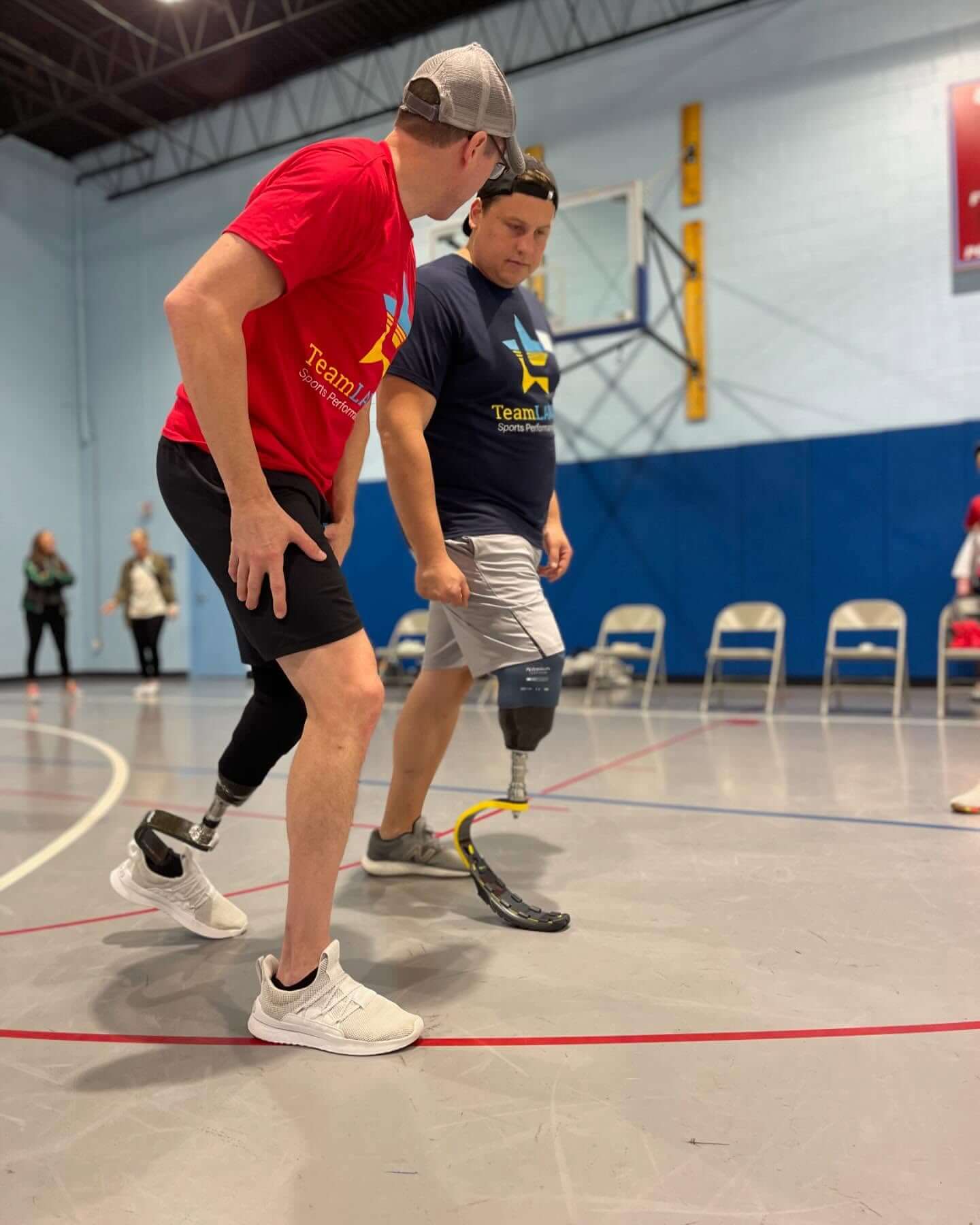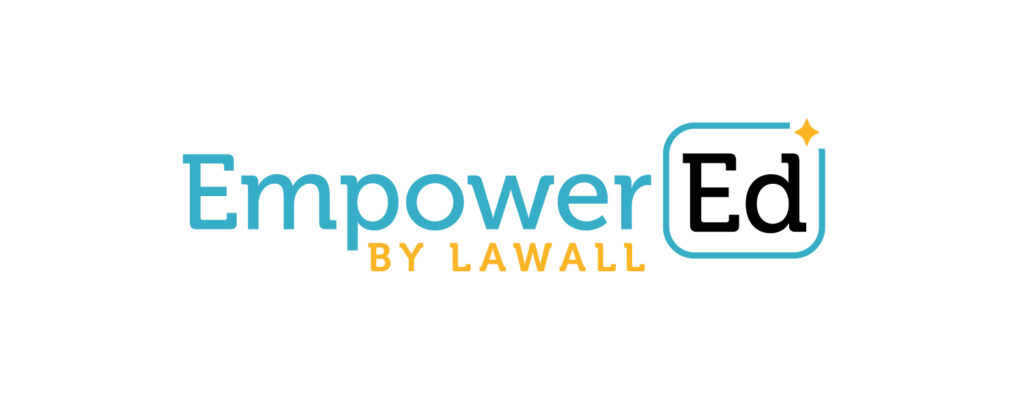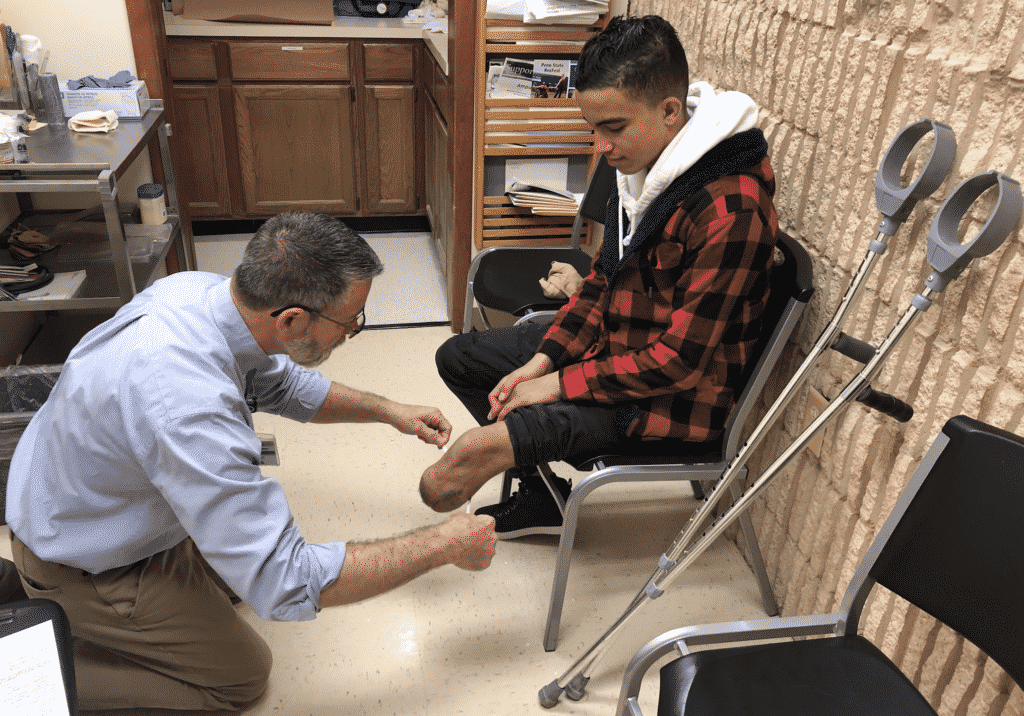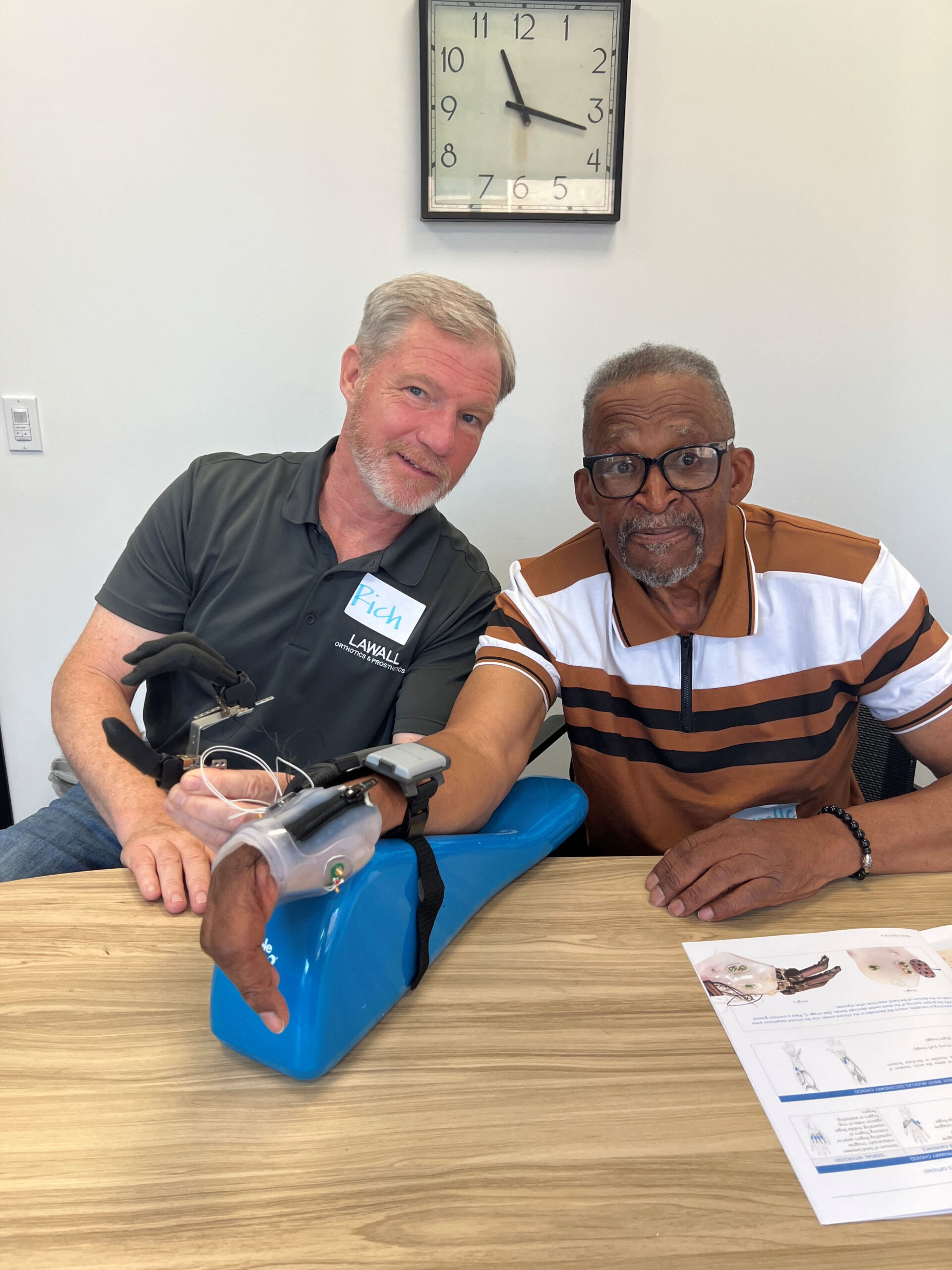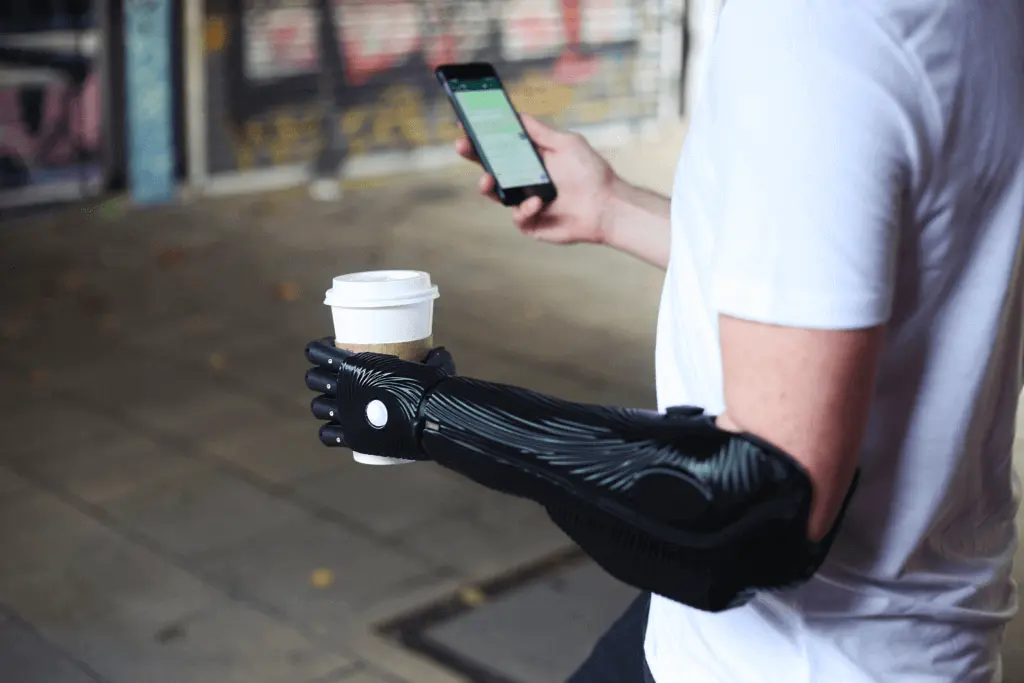Izzeddin Alnawasra
Walking Home to Gaza
The rigors of daily life in a war zone are unimaginable to many; it’s a world filled with hardships, insecurities, and very real dangers to life and limbs. Izzeddin Alnawasra, a 15-year old survivor of such a life, lost his leg in a traumatic amputation after sustaining a gunshot wound in May 2018. He later came from Gaza, a Palestinian territory on the eastern coast of the Mediterranean Sea, to the United States, and arrived in a wheelchair—but “with a smile that would light up his whole face!” remembers Mike Kelly, CP, Izz’s prosthetist at Lawall.
Izzeddin was born in Refugee Camp Magahzi, a United Nations-operated camp established in 1948, where he lives with his parents, four brothers, a sister, and about 50,000 other camp residents.
When their efforts to help him get fitted with a prosthesis were unsuccessful, his family sought aid from the Palestine Children’s Relief Fund (PCRF), an American Humanitarian organization with three offices in Gaza.
“They wanted to know if we could help their son walk again,” remembers Dunia Saed, Patient Affairs Coordinator for PCRF, who works to arrange medical care for kids like Izz. “At about that same time, we were setting up a volunteer chapter in Harrisburg, Pa., where we would have volunteers able to support him during his medical journey.”
An online search for a nearby prosthetic provider willing to offer their time and talent to help Izz led them to Lawall.
Arrangements were finalized, a visa obtained for Izz, and travel arrangements were made that brought him to Harrisburg in March 2019, where he stayed with a host family during the fitting of his prosthesis, and the adjustment period that followed.
Kelly remembers him as “a very soft-spoken young gentleman, very mature. For a young man, he’s mature in the way he handles responsibility. I gathered that his life included responsibilities like catching fish and food to eat for each day. He was respectful of people or elders, but also respectful of what we were going to be doing for him.”
Although Izz didn’t speak English, Kelly experienced no difficulty in communicating with him. Not only did Izz have reliable translators, but having raised three children himself, Kelly caught the unspoken messages in the teenager’s expression and tone of voice, he reports with a chuckle. “Maybe I could just hear the adolescence coming out in him from time to time! He was being a gentleman, but he was informative in many ways,” Kelly laughed. “He would give me a look –or maybe just a smile and a thumbs-up.”
Kelly found Izz to be a natural teacher. “He encouraged me to learn his language, teaching me how to say ‘hello’ and ‘thank you’. Then, when we’d see each other a week or two later, I could greet him in his own language. A teacher teaches information, but they also are able to teach through their life experience, and through his demeanor, his friendliness and kindness, he has such a lot to teach other people—as he has already taught me.”
Back on Two Feet Again
The components for Izz’s below-knee prosthesis were provided by Ossur Americas, Kelly notes, “and Lawall’s generosity allowed me and Joe Howanec, the prosthetic technician, to work to provide what was necessary. Body weight, lengths and heights are frequent changes as young people grow, so we tried to use modular components that are used pretty much worldwide, so they could change out parts that might need replacing.”
Kelly describes the ProFlex XC foot Ossur provided as “a very good dynamic foot for active people, so he would benefit from energy efficiency while wearing his prosthesis.”
Although the prosthesis is built with strong titanium components, and it’s a good choice for one active in sports, it’s unlikely that Izz will risk breaking it by participating in sports.
Steve Sosebee, PCRF CEO, explained: “The prospects of getting it repaired are not as high as they are in the U.S. There is a soccer team there for amputees in Gaza, but it’s without the prosthetic leg. They use their crutches, because the wear and tear of landing on your leg is really intense. A lot of the kids that we’ve had treated are on that soccer team.”
Kelly also describes soccer organizations which enable amputees to play without a prosthesis, while using elbow or forearm crutches. “The players know how to swing through and kick very effectively. They are impressively strong.”
Izz’s positive attitude and commitment continued to impress Kelly throughout his series of fitting visits.
“Being young and determined, he learned quickly on his own,” Kelly observed. “He initially left the office on crutches, came back in three weeks using just a cane, and when he left us to return home, in less than two months, he was walking well, without the cane!
“He was very trusting and willing, from the onset,” Kelly remembers. “I look at my role as providing a tool, and if people are motivated and willing and determined, they’re the ones that really apply themselves, and do what’s necessary to use the tool wisely.”
Izzedin’s courage, friendliness and determination made him a successful patient Kelly won’t soon forget.
“We don’t often have cases like his, and the opportunity to help a young person with such a strong willingness to succeed is very rewarding. Seeing the outcome, and getting the satisfaction from his success, makes it fulfilling in so many ways to offer our help.”
What lies ahead in Izzeddin’s future?
On May 17, as he was preparing to return to Gaza with his new prosthesis, Izz answered questions, with Sosebee serving as translator. “He’s comfortable wearing the prosthesis,” Sosebee confirms. “There’s no pain and he’s happy with it, but still getting used to the adjustment of having to put on a prosthesis every day and walk.”
Although Izzeddin still experiences a little bit of a limp and a little bit of a gait stop, we learn, he’s continuing to work on it. Although as recently as five months earlier, he had been suffering from phantom pain caused by his absent limb, there has been no more phantom pain since he’s had the prosthetic leg.
Asked about his career plans, Izz replied that he’d like to be a doctor—to help other kids like himself get care.
PCRF and its personnel are willing to stand behind that dream, says Sosebee.
“We’ll put the ball in his court a little bit. Obviously to become a doctor, you have to work hard and show some initiative. So if he has that—if he goes to school and studies hard—then we certainly can open doors for him and give him the chance to succeed. There are universities and medical schools there, and we’ll help him out for sure.”
Sosebee relayed Izz’s thanks to everybody in the U.S. who has helped him. Everyone was very kind to him and made him feel very welcome and he really appreciated it—he wasn’t expecting that.
What surprised him most about the United States, however, during his sightseeing visits to New York and Washington, D.C., was how big it is, compared to his small country. His host family reported on the amount of walking he accomplished, Kelly noted.
His return home to Palestine occurred during Ramadan, a month-long observation of daytime fasting, so Izzeddin was eagerly looking forward to being reunited with the family members he hadn’t seen since March—and having dinner with them.
PCRF shared their appreciation—and Izz’s clear delight!—in a May 20, 2019 Facebook post and airport photo that were all the reward one could wish for. The message concluded, “Thank you so much for making it possible to see him return home walking again. Bless you all!”
The Palestine Children’s Relief Fund is an American Humanitarian organization that has been providing medical support to the children of Palestine for 26 years. They have made it possible for more than 2,000 children to be sent out of the country to receive free care, and they sponsor medical missions into Palestine to treat as many as 7,000 children each year.
PCRF has 32 volunteer chapters throughout the United States, from Portland, Oregon to Atlanta, Georgia, and from New Jersey to San Diego. They also serve Palestinian children from three offices in Gaza and six in the West Bank, where families can go to request assistance
Visit https://www.pcrf.net
